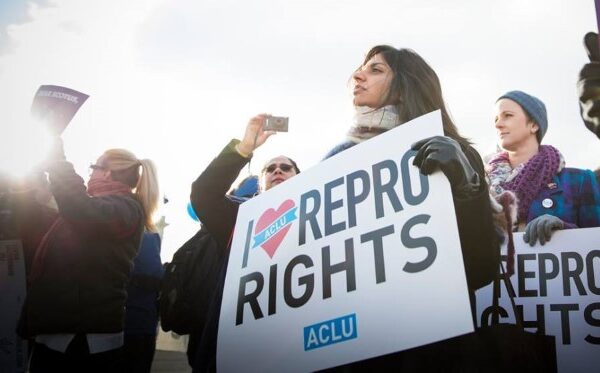Almost five decades ago, the United States Supreme Court affirmed a constitutional right to safe, legal abortion care in the landmark case Roe v. Wade. That right was reaffirmed in 2016 in Whole Women’s Health v. Hellerstedt. A lot has changed since Roe was decided, but one thing hasn’t changed: those who are pregnant need the freedom to make the decisions that are best for themselves and their families and once that deeply personal decision has been made government and politicians need to stop judging and stop interfering with access to abortion care.
As a new mom to a wonderful baby boy, I can tell you that becoming a parent is one of the biggest, most life-altering decisions anyone can ever make. When people are able to make decisions that are best for their families with autonomy and dignity, they thrive and their communities flourish.
Despite the constitutional precedent established in Roe v. Wade, anti-abortion politicians across the country have been hard at work trying to take away the right to safe and legal abortion. While many of the most extreme measures have thus far been struck down by courts as blatantly unconstitutional, the possibility that Supreme Court Justices appointed by President Trump could undo decades of precedent means that these restrictions could become law.
In the past 10 years, states have quietly passed more than 400 restrictions on access to abortion. As part of this concerted relentless national strategy to push abortion care out of reach, anti-abortion Nebraska state senators introduced a ban, LB 814, earlier this month. This ban targets the standard of care in abortions after 14 weeks and makes it a crime for doctors to use their best medical judgment.
I understand that Nebraskans of goodwill hold different beliefs on abortion but a majority of Nebraskans agree that regardless of how we personally feel about abortion, there is no room for politics in deeply personal medical decisions. Nebraska State Senators could be focusing on measures to improve women’s health by, for example, expanding health care options for rural Nebraskans and increasing access to contraceptives. Instead, these anti-abortion politicians are interfering with doctors’ medical judgment and in turn simultaneously undermining a fundamental constitutional right while putting women’s health in jeopardy. The importance of taking action cannot be overstated. There has truly never been a more important time to protect a right so fundamental to liberty, freedom, and dignity.
Together with Planned Parenthood and the Women’s Fund of Omaha, the ACLU of Nebraska encourages Nebraskans to contact their legislators on Tuesday, Jan. 22 to tell them how important it is that they protect access to sexual and reproductive care – including abortion care – and how they would like to see them expand access to quality, affordable care especially in rural and low income areas, including contraception, prenatal care and preventative screenings.
RESOURCES
NEBRASKA RESTRICTIONS ON ABORTION
- Patients are required to listen to biased counseling to discourage them from having an abortion and must then wait 24 hours before a procedure.
- Private health insurance or health insurance for public employees cannot cover abortions except in cases of life endangerment or if an optional rider is purchased by the individual.
- Nebraska health plans under the Affordable Care Act cannot cover abortions except in cases of life endangerment.
- Telemedicine cannot be used to administer medication abortion.
- Individuals 17 and under must get consent from a guardian before obtaining an abortion or must go through the judicial bypass process to get permission from a court to have an abortion without parental consent.
- No public funding is available for abortions except in cases of life endangerment, incest, or rape.
- An abortion 20 or more weeks postfertilization is only permitted in cases of life endangerment or risk of significant bodily harm. The law is based on the idea, which is not backed by scientific evidence, that a fetus can feel pain at this point.
- Only a physician in the same room as the patient may perform an abortion.

